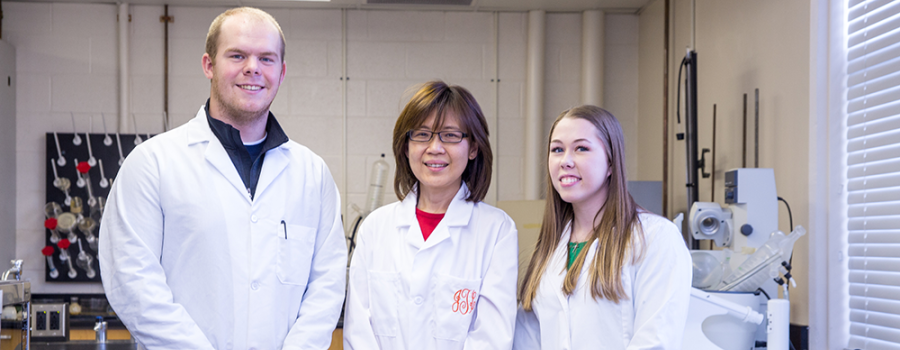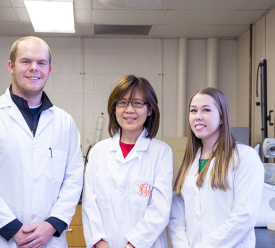Having a clean, healthy smile can change someone’s life.
One of the most important steppingstones on your path to a future dental or natural science career is having the right undergraduate preparation. Dental schools are actively looking for candidates with well-rounded backgrounds in science and mathematics, as well as other academic areas like English, humanities, and social sciences. This is where Cumberland’s pre-dentistry program shines.
In addition to experiencing a robust curriculum in general studies, as a student majoring in pre-dentistry at Cumberlands, you’ll begin learning dental theory and practice. Whether you’re pursuing a career in general dentistry or a specialty in oral surgery, you’ll be fully equipped with the knowledge and skills you need to succeed in this diverse and rewarding field. Pre-dentistry graduates are valued in many different jobs, meaning you’ll have the flexibility to work in a variety of settings such as dental clinics, physicians' offices, and outpatient care centers. The possibilities you’ll find in the field of oral healthcare are endless!
By the Numbers
$163,220
6%
5
1 in 5
Programs & Requirements
* The credit hours listed on this page only reference the specific program requirements and is not reflective of the total hours necessary to receive your degree. Cumberlands requires all students obtain a minimum of 60 hours for an associate’s degree and a total of 120 hours for a bachelor’s degree. Transfer and prior learning credits may be counted toward those totals.
To learn more about our General Education Requirements, please visit the page referenced below or explore our Academic Catalog.
You need a pre-dental program that is uniquely designed to help you find success through focused studies in biology and chemistry. Good news: University of the Cumberlands has just what you’re looking for. Advisors in our pre-dental program will help you plan the course of study that best fits your personal interests and career goals. Plus, they understand the entrance procedures and requirements of various post-baccalaureate programs – like dental school.
If you’re considering a career in the dental industry, explore the pre-dental courses, extracurricular experiences, and work-study opportunities you’ll need to succeed, all right here at Cumberlands.
Officially a "Bachelor of Science in Biology - Pre-Professional Health Emphasis" at Cumberlands, this program prepares you for admission into the dental school of your choice by offering a depth of understanding of the biological sciences, as well as experience in chemistry and math.
Course Requirements
Students interested in applying to medical, dental, or veterinary school are strongly encouraged to complete these courses. It is important to review the admissions requirements requirements for each program to which you will apply because the prerequisites for admission may be slightly different among professional schools.
- BIOL 331 - Vertebrate Embryology
- BIOL 342 - Parasitology
- BIOL 345 - Microbiology
- BIOL 346 - Biochemistry
- BIOL 436 - Medical Biochemistry
- BIOL 441 - Immunology
- BIOL 442 - Comparative Anatomy
- BIOL 443 - General Physiology
- BIOL 445 - Molecular Biology
- BIOL 446 - Advanced Cell Biology
- BIOL 447 - Histology
This option is recommended for students entering a “blended” area such as pre-professional medically related areas (medicine, dentistry, pharmacy, physician assistant, physical therapist, etc.), chemistry/business, and chemistry/biology.
MATH 140, MATH 240, PHYS 241, and PHYS 242 are prerequisites for some upper-level chemistry courses.
- CHEM 132 - General College Chemistry I
- CHEM 111 - General Chemistry Laboratory I
- CHEM 232 - General College Chemistry II
- CHEM 211 - General Chemistry Laboratory II
- CHEM 331 - Organic Chemistry I
- CHEM 321 - Organic Chemistry Laboratory I
- CHEM 332 - Organic Chemistry II
- CHEM 322 - Organic Chemistry Laboratory II
- CHEM 336 - Analytical Chemistry
- CHEM 328 - Analytical Chemistry Laboratory
- CHEM 441 - Physical Chemistry I with Laboratory
- CHEM 434 - Inorganic Chemistry
- CHEM 490 - Senior Research Project
- CHEM 491 - Selected Topics in Chemistry
A Bachelor of Arts degree requires completing the same courses as a Bachelor of Science with the addition of completing one foreign language sequence through the intermediate level.
- FREN 131 Elementary French I
- FREN 132 Elementary French II
- FREN 231 Intermediate French I
- FREN 232 Intermediate French II
- SPAN 131 Elementary Spanish I
- SPAN 132 Elementary Spanish II
- SPAN 231 Intermediate Spanish I
- SPAN 232 Intermediate Spanish II
Take the Next Step
Mission and Goals
The mission of the pre-dentistry program at University of the Cumberlands is to provide the knowledge and skills that will prepare you for dental school and help you succeed in various fields of service in oral care and related sciences.
Pre-Dentistry Careers & Outcomes
All stats from U.S. Bureau of Labor Statistics
Dentist: $163,220
Dentist: $163,220
Dentists diagnose and treat problems with patients’ teeth, gums, and related parts of the mouth.
Dental Hygienist: $77,810
Dental Hygienist: $77,810
Dental hygienists examine patients for signs of oral diseases, such as gingivitis, and provide preventive care, including oral hygiene.
Medical Assistant: $37,190
Medical Assistant: $37,190
Medical assistants complete administrative and clinical tasks in hospitals, offices of physicians, and other healthcare facilities.
Chemist: $79,760
Chemist: $79,760
Chemists and materials scientists research and analyze the chemical properties of substances to develop new materials, products, or knowledge.
Natural Sciences Manager: $137,900
Natural Sciences Manager: $137,900
Natural sciences managers supervise the work of scientists, including chemists, physicists, and biologists.
Clinical Researcher: $95,310
Clinical Researcher: $95,310
Medical scientists conduct research aimed at improving overall human health.
Common Questions
A pre-dental degree is an undergraduate program designed to prepare students for dental school and a career in dentistry. The program provides a robust foundation in sciences such as biology, chemistry, and mathematics, along with general education courses. Students begin learning dental theory and practice, setting the stage for more specialized study in dentistry or related fields.
A pre-dental degree typically takes four years to complete when pursued as a full-time bachelor's program. The program involves completing general education requirements as well as specialized courses, totaling 55 credit hours specific to pre-dentistry studies.
A pre-dental degree is typically not available entirely online due to the hands-on nature of dental education, especially in laboratory and clinical settings. While some prerequisite courses may be available online, most programs will require on-campus attendance for practical training and labs to ensure proper preparation for dental school.
A pre-dental degree is worth it for those who aspire to become dentists or work in related fields within oral healthcare. This degree provides the essential preparation for dental school, offering a strong academic background that dental schools seek in candidates. It also opens up various career opportunities in dental and health sciences.
With a pre-dental degree, you can pursue various careers in the dental field and beyond, such as becoming a dentist, dental hygienist, medical assistant, chemist, natural sciences manager, or clinical researcher. The degree also prepares you for further education and specialization in dental school.
To obtain a pre-dental degree, you need to enroll in an accredited pre-dental program, like the one offered by University of the Cumberlands. The program includes general education courses along with specialized courses in biology, chemistry, and other sciences, laying the groundwork for dental school and a career in oral healthcare.
Dental school typically takes four years to complete after earning an undergraduate degree. The first two years focus on classroom and laboratory studies, while the last two years involve clinical practice under supervision.
While there is no specific major required to become a dentist, common choices include biology, chemistry, or a pre-dentistry track. These majors provide the necessary science background that is essential for success in dental school.
Yes, pre-dental can be considered a major, particularly when it is structured as a focused pre-professional track within an undergraduate program. This track is designed to meet the prerequisites for dental school while providing relevant coursework in sciences and general education.
Faculty Experts in Pre-Dentistry
Learn more about the pre-dentistry professors you will interact with.

Ms. Kara Stanley

Jeffrey Schwarz
Jeffrey Schwarz
Contact Information

Dr. Leif Deyrup
Dr. Leif Deyrup
Contact Information
Request Information
Have more questions? Let us answer them!

